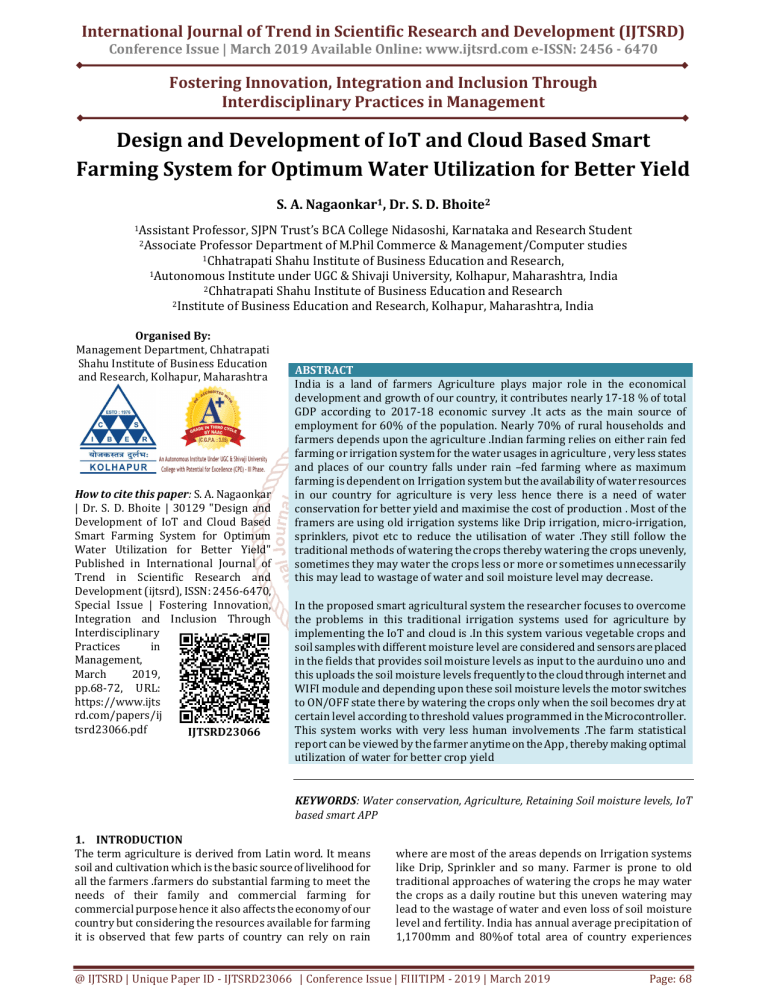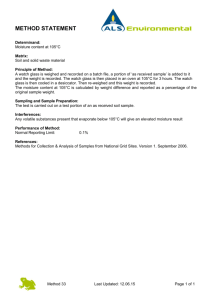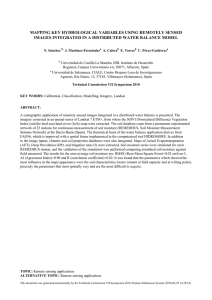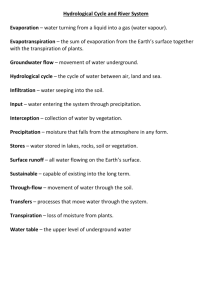
International Journal of Trend in Scientific Research and Development (IJTSRD)
Conference Issue | March 2019 Available Online: www.ijtsrd.com e-ISSN: 2456 - 6470
Fostering Innovation, Integration and Inclusion Through
Interdisciplinary Practices in Management
Design and Development of IoT and Cloud Based Smart
Farming System for Optimum Water Utilization for Better Yield
S. A. Nagaonkar1, Dr. S. D. Bhoite2
1Assistant
Professor, SJPN Trust’s BCA College Nidasoshi, Karnataka and Research Student
Professor Department of M.Phil Commerce & Management/Computer studies
1Chhatrapati Shahu Institute of Business Education and Research,
1Autonomous Institute under UGC & Shivaji University, Kolhapur, Maharashtra, India
2Chhatrapati Shahu Institute of Business Education and Research
2Institute of Business Education and Research, Kolhapur, Maharashtra, India
2Associate
Organised By:
Management Department, Chhatrapati
Shahu Institute of Business Education
and Research, Kolhapur, Maharashtra
How to cite this paper: S. A. Nagaonkar
| Dr. S. D. Bhoite | 30129 "Design and
Development of IoT and Cloud Based
Smart Farming System for Optimum
Water Utilization for Better Yield"
Published in International Journal of
Trend in Scientific Research and
Development (ijtsrd), ISSN: 2456-6470,
Special Issue | Fostering Innovation,
Integration and Inclusion Through
Interdisciplinary
Practices
in
Management,
March
2019,
pp.68-72, URL:
https://www.ijts
rd.com/papers/ij
tsrd23066.pdf
IJTSRD23066
ABSTRACT
India is a land of farmers Agriculture plays major role in the economical
development and growth of our country, it contributes nearly 17-18 % of total
GDP according to 2017-18 economic survey .It acts as the main source of
employment for 60% of the population. Nearly 70% of rural households and
farmers depends upon the agriculture .Indian farming relies on either rain fed
farming or irrigation system for the water usages in agriculture , very less states
and places of our country falls under rain –fed farming where as maximum
farming is dependent on Irrigation system but the availability of water resources
in our country for agriculture is very less hence there is a need of water
conservation for better yield and maximise the cost of production . Most of the
framers are using old irrigation systems like Drip irrigation, micro-irrigation,
sprinklers, pivot etc to reduce the utilisation of water .They still follow the
traditional methods of watering the crops thereby watering the crops unevenly,
sometimes they may water the crops less or more or sometimes unnecessarily
this may lead to wastage of water and soil moisture level may decrease.
In the proposed smart agricultural system the researcher focuses to overcome
the problems in this traditional irrigation systems used for agriculture by
implementing the IoT and cloud is .In this system various vegetable crops and
soil samples with different moisture level are considered and sensors are placed
in the fields that provides soil moisture levels as input to the aurduino uno and
this uploads the soil moisture levels frequently to the cloud through internet and
WIFI module and depending upon these soil moisture levels the motor switches
to ON/OFF state there by watering the crops only when the soil becomes dry at
certain level according to threshold values programmed in the Microcontroller.
This system works with very less human involvements .The farm statistical
report can be viewed by the farmer anytime on the App , thereby making optimal
utilization of water for better crop yield
KEYWORDS: Water conservation, Agriculture, Retaining Soil moisture levels, IoT
based smart APP
1. INTRODUCTION
The term agriculture is derived from Latin word. It means
soil and cultivation which is the basic source of livelihood for
all the farmers .farmers do substantial farming to meet the
needs of their family and commercial farming for
commercial purpose hence it also affects the economy of our
country but considering the resources available for farming
it is observed that few parts of country can rely on rain
where are most of the areas depends on Irrigation systems
like Drip, Sprinkler and so many. Farmer is prone to old
traditional approaches of watering the crops he may water
the crops as a daily routine but this uneven watering may
lead to the wastage of water and even loss of soil moisture
level and fertility. India has annual average precipitation of
1,1700mm and 80%of total area of country experiences
@ IJTSRD | Unique Paper ID - IJTSRD23066 | Conference Issue | FIIITIPM - 2019 | March 2019
Page: 68
International Journal of Trend in Scientific Research and Development (IJTSRD) @ www.ijtsrd.com eISSN: 2456-6470
rainfall of 750mm. Nearly 90% of population comes under
water stress .Hence there is an intense need of water
conservation and increase the production cost also and
maximise the yields by optimal water usages. There is a need
of adopting latest technologies so that the farming can be
carried out efficiently with less human intervention and by
making usage of optimal resources for farming .In this paper
the researcher focuses on latest technologies like IoT and
Cloud with the implementation of this system various soil
moisture sensors cab be placed in the farm that frequently
monitors the soil moisture levels and depending upon the
moisture level the watering is done to the crops in the farm
automatically.
1.1. Literature Review
As our agriculture plays vital role for our country as well as
for farmers .Considering the current scenarios water
availability for agriculture is very less. Water resources
available for irrigation are also very less which is threatening
the biodiversity and food production .there is also need to
preserve the arable land and soil fertility. Hence to utilize all
the resources efficiently and to conserve them smart farming
is needed this can be implemented using 1. IOT (Internet Of
things)It is a system of interrelated computing devices,
mechanical and digital machines, objects, animals or people
that are provided with unique identifiers and the ability to
transfer data over a network without requiring human-tohuman/human-to-computer interaction.” .
The other one is Cloud Services: Cloud computing is
availability of open space to store the data and utilize the
data for analysing purposes. Different smart farming systems
are developed using various devices like Zigbee, Bluetooth
Module, Wi-Fi Modules ,GSM Modules ,GPRS Modules, RFID
all these are built on different IoT nodes like Arduino Uno,
Node Mcu, Raspberry Pi and so many Different nodes can be
used on the requirements of the system. some of the devices
has advantages and disadvantages over each other and some
are cost variant. Different systems are designed for
automated irrigation system which senses the different
attributes of soil and water the farm accordingly. Hence the
researcher focused on developing a system which will
overcome all the constraints like cost the researcher
implemented this system which works on wireless
communication and farmer can get the reporting of farm in
any part of world and entire farm will be automated and
optimal water is used to get better yield.
System Overview
The proposed system is implemented using four major
components Microcontroller Aurduino Uno, Soil Moisture
level Sensors, Wi-Fi Module, Relay. LCD display and Motor.
The block diagram is as shown below
Block Diagram of the System
Hardware Used:
A. Aurduino Uno Microcontroller: It is an open source with
both hardware and software drive with 8 bit ATmega328
a low power CMOS controller based on RISC architecture
.It has highest performance with variety of choices fully
static operation and self programmable flash program
memory in the system. It can be powered using USB cable
from computer either an AC mains supply.
Arduino Uno
B. Soil sensor: This soil sensor detects the moisture level of
soil on field from 20%(wet) - 200 % (dry). It is a circuit
board having two probes which senses the soil status.
This sensor will show the volumetric content of soil and
loss of water content due to evaporation. This sensor is
merged with the controller and coded.
The sensor contains two fingers through those current is
passed to soil when sensor is placed in the soil. The sensor
finger passes more current to soil with less resistance
indicates the soil is wet where as the probes pass less
current with high resistance indicates that soil is dry. This
values of resistance helps us to detect the soil moisture
status
@ IJTSRD | Unique Paper ID - IJTSRD23066 | Conference Issue | FIIITIPM - 2019 | March 2019
Page: 69
International Journal of Trend in Scientific Research and Development (IJTSRD) @ www.ijtsrd.com eISSN: 2456-6470
F. LCD Display: This is a basic 16 character by 2 line display.
Black text on Green background Utilizes the extremely
common HD44780 parallel interface chipset (datasheet).
Interface code is freely available. You will need ~11
general I/O pins to interface to this LCD screen. Includes
LED backlight.
C. Wi-Fi ESP8266 MODULE
This module is a self contained socket which is capable of
hosting an application .It contains the TCP/IP stack and
microcontroller capability, this module allows
microcontrollers to connect to Wi-Fi networks. It has 16
GPIO pins
Software Used
A. Arduino IDE
D. Water motor: The motor is connected to the relay for
managing the flow of current. Motor pump is used to
pump the water from water storage during the
requirement of water to the soil/field
E. Relay: It is used to connect the valves to the
microcontroller, the ignition key when turned ON; the
electricity flows through the relay and then connects the
battery to the motor to start. They allow low power
circuits with small switch
Arduino can be programmed using this IDE, it is very simple
and easy to use. A sketch is the file where the code is saved.
It uses language similar to C++ and later it translates to MLL
to execute the code this is called compilation .Here the
researchers is using Arduino Uno board .After the code is
ready it is dumped on to the board and it is ready to run.
B. Thing speak
@ IJTSRD | Unique Paper ID - IJTSRD23066 | Conference Issue | FIIITIPM - 2019 | March 2019
Page: 70
International Journal of Trend in Scientific Research and Development (IJTSRD) @ www.ijtsrd.com eISSN: 2456-6470
Thing speak is free web service to store the sensors data to
the cloud and use the same data for data analytics .It
contains apps that provide data analytics and data
visualizations. Any of the sensor data can be sent to this web
service using Arduino, Node Mcu and Raspberry Pi and other
hardware..
Readings uploaded to Cloud web service (Registered IoT
Account)
We need to register to the site and start using the service by
using the API keys generated .it access the data from sensors
using HTTP protocol and picks the data from things using
network
2. Output of field and Graph Reports.
These are the sample outputs of different days.
of soil moisture levels placed in the farms
Working of the system
The system is built by using Arduino Uno and Wi-Fi Module,
two soil moisture level sensors, Relay and LCD. The soil
@ IJTSRD | Unique Paper ID - IJTSRD23066 | Conference Issue | FIIITIPM - 2019 | March 2019
Page: 71
International Journal of Trend in Scientific Research and Development (IJTSRD) @ www.ijtsrd.com eISSN: 2456-6470
moisture level sensors senses the moisture level frequently
and the microcontroller processes the data and sends
through the registered Wi-Fi module which can access the
internet and upload the data to the cloud in the web service.
Depending upon the soil moisture levels the motor is turned
ON/OFF automatically. In this system the motor turns ON
when the dry level is detected (>170) and watering is made
until required moist level and later turned OFF meanwhile
all the values are uploaded to the cloud later they can be
utilised for data analysis. In this system optimal watering is
done in the farm which is done automatically.
Conclusion
As The earth is left out with limited resources for agriculture
there is an utmost need to preserve our resources such as
arable land ,water and fertile soil which can also help the
farmer to produce more quality yield and increase the cost of
production .Hence there is a need of adoption of
Modernisation in Agriculture such as smart farming which
will reduce human intervention and by using optimal
resources like water the framer can grow more yield which
will also help in the economical growth of the country
Future Scope
This system helps us to identify the soil moisture levels in
the field and water accordingly. We can enhance this system
using water flow sensors and analyse the water content
utilised for the entire farm to obtain the yield.
References
[1] Jean-Jacques Dethier A, Alexandra Effen Berger B,* A
Development Economics Department, The World Bank,
Washington, DC, United States Department Of
Economics, Brown University, Providence, RI, United
States . Article History: Received 28 February 2011
Received In Revised Form 12 September 2011
[2] Dr. Vibha Dhawan, Distinguished Fellow And Senior
Director New Initiatives And Programmes, The Energy
And Resources Institute (TERI), Water And Agriculture
In India . Background Paper For The South Asia Expert
Panel During The Global Forum For Food And
Agriculture (GFFA) 2017. Published By: OAV – German
Asia-Pacific Business Association Within The Frame Of
The Bilateral Cooperation Project On The Development
Of International Cooperation With Asia, Co-Funded By
The Federal Ministry Of Food And Agriculture(BMEL)
[3] Alan Robock, Konstantin Y. Vinnikov, Govindarajalu
Srinivasan, Jared K. Entin, Steven E. Hollinger, Nina A.
Speranskaya, & Suxia Liu, And A. Namkhai , The Global
Soil Moisture Data Bank Vol. 81, No. 6, June 2000
[4] N. K. Suryadevara, S. C. Mukhopadhyay, Review On Iot
Based Smart Agriculture, International Journal Of
Advanced Engineering & Innovative Technology
(IJAEIT) ISSN: 2348 7208 Published In 2011
[5] Vinayak N. Malavade , Pooja K. Akulwar 1,2(Department
of Computer Science and Engineering, SGI, Atigre, India)
Role of IoT in Agriculture IOSR Journal of Computer
Engineering (IOSR-JCE) e-ISSN: 2278-0661,p-ISSN:
2278-8727 PP 56-57
[6] R. Nandhini , S. Poovizhi , Priyanka Jose , R. Ranjitha , Dr.
S. Anila Students- Department of Electronics and
Communication Engineering, Sri Ramakrishna Institute
of Technology, Coimbatore. Associate Professor,
Department of Electronics and Communication
Engineering Sri Ramakrishna Institute Of Technology,
Coimbatore. . Arduino based smart irrigation system
using iot 3 rd National Conference on Intelligent
Information and Computing Technologies, IICT ‘17
[7] Mohanraj I*a , Kirthika Ashokumarb , Naren Jc a B. Tech
Computer Science and Engineering, School of
Computing, SASTRA University,
Thanjavur - 613401, India. b B.
Tech Computer Science and
Engineering, School of Computing,
.Field Monitoring and Automation using IOT in
Agriculture Domain 6th International Conference On
Advances In Computing & Communications, ICACC 2016,
6-8 September 2016, Cochin, India
[8] Yunseop Kim and Robert G. Evans, “Remote Sensing and
Control of an Irrigation System using a Distributed
Wireless Sensor Network” presented at IEEE
Transactions on Instrumentation and Measurement,
Vol57, July-2008.
[9] Sjaak Wolfert , Lan Ge , Cor Verdouw Marc-Jeroen
Bogaardt ,Wageningen University and Research, The
Netherlands
,Information
Technology
Group,
Wageningen University, The Netherlands, Big Data in
Smart Farming – A review. Article.
[10]
Agricultural History Society is collaborating with
JSTOR to digitize, preserve and extend access to
Agricultural History.
Copyright © 2019 by author(s) and International Journal of
Trend in Scientific Research and Development Journal. This
is an Open Access article distributed under the terms of the
Creative Commons Attribution License (CC BY 4.0)
(http://creativecommons.org/licenses/by/4.0)
@ IJTSRD | Unique Paper ID - IJTSRD23066 | Conference Issue | FIIITIPM - 2019 | March 2019
Page: 72




